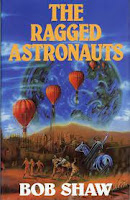As is obvious to everyone except the people who believe in the value of sff awards, popularity does not automatically equate to literature that transcends it's era. Accordingly, many if not most of the nest sff books of the past century lie outside that matrix. And it's that type of book I hope to find exploring those strange byways of literary history. I have heard a few whispers that Bob Shaw is a name virtually lost to genre history worth a read. Let's take a look at The Ragged Astronauts (1986).
Land and Overland, sister worlds separated by only a few thousand miles, are the setting of The Ragged Astronauts. Things begin on Land, a planet with no metals. Technology and industry plant-based, but the manner in which people organize themselves remains familiar. Although the first quarter of the novel takes its time settling in, it eventually does on the character Toller, a rebellious but natural reader employed in menial labor for the Philosophers, a group of people who speculate on and research the latest scientific breakthroughs. Slowly depleting itself of resources, the monarchy Toller is a reluctant part of makes some drastic decisions to fix its situation, his role in the transformation soon to be more than menial.









